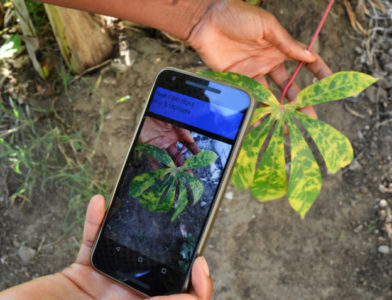Lima, Peru – The International Potato Center (CIP) announces that it is a winner of a Grand Challenges Explorations grant – an initiative funded by the Bill & Melinda Gates Foundation. Jan Kreuze, Leader of CIP’s Crops and Systems Sciences Division, will pursue an innovative global health and development research project titled: “Develop smartphone-based diagnostics platform linking artificial intelligence image-based disease recognition with microfluidic isothermal amplification diagnostic tools.”

Grand Challenges Explorations (GCE) supports innovative thinkers worldwide to explore ideas that can break the mold in how we solve persistent global health and development challenges. Kreuze’s project is one of 34 Grand Challenges Explorations Round 21 grants recently announced by the Bill & Melinda Gates Foundation.
To receive funding, Dr. Kreuze and other GCE winners demonstrated in a two-page online application a bold idea in one of three critical global heath and development topic areas. The foundation will be accepting applications for the next GCE round in February, 2019.
The project led by Dr. Kreuze has the potential to significantly improve and expand the diagnosis – and thereby control – of crop diseases that threaten the food security and livelihoods of millions of smallholder farmers across Africa. CIP researchers and partners at the International Institute of Tropical Agriculture (IITA), Penn State University and the University of Wisconsin will combine the use of molecular diagnostic tools for identifying virus diseases in sweetpotato and cassava with an image-based mobile phone application that uses artificial intelligence to diagnose crop diseases.
By matching thousands of photos of plants with the results of molecular tests, the researchers aim to make the image-based artificial intelligence program as accurate as a crop specialist, if not more accurate. This would allow any farmer or extension agent with a smart phone to get a diagnosis of a crop disease in the field. Kreuze noted that smart phones are expected to become common in rural Africa over the next decade, which will enable millions of smallholder farmers and extension agents to use this rapid diagnostic tool.
“By taking photos of infected plants with the camera on their phone, farmers could not only get a diagnosis but also advice on how to manage the disease.” Kreuze said. “This low-cost technology could improve the food production and incomes of millions of African families.”
About Grand Challenges Explorations
Grand Challenges Explorations is a US$100 million initiative funded by the Bill & Melinda Gates Foundation. Launched in 2008, over 1400 projects in more than 65 countries have received Grand Challenges Explorations grants. The grant program is open to anyone from any discipline and from any organization. The initiative uses an agile, accelerated grant-making process with short two-page online applications and no preliminary data required. Initial grants of US$100,000 are awarded two times per year. Successful projects have the opportunity to receive a follow-on grant of up to US$1 million.
About the International Potato Center (CIP)
Headquartered in Lima, Peru, CIP was founded in 1971 as a root and tuber research-for-development institution delivering sustainable solutions to the pressing world problems of hunger, poverty and the degradation of natural resources. CIP is custodian to a collection of potato, sweetpotato and Andean roots and tubers including the world’s largest in-vitro collection of potato diversity. CIP has regional offices in Ecuador, Kenya, India and China and projects in more than 20 developing countries across Asia, Africa and Latin America. www.cipotato.org
CIP and IITA are CGIAR research centers, part of a global partnership for a food-secure future. CGIAR science is dedicated to reducing poverty, enhancing food and nutrition security, and improving natural resources and ecosystem services. Its research is carried out by 15 CGIAR centers, in close collaboration with hundreds of partners, including national and regional research institutes, civil society organizations, academia, development organizations and the private sector. www.cgiar.org
